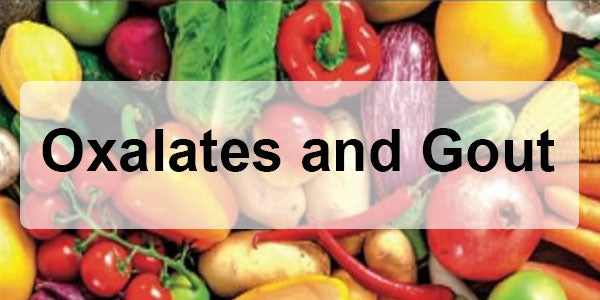If you’re a sufferer of gout, you have probably tried all manner of home remedies, supplements and dietary changes to curb the pain and discomfort associated with the condition. Gout is known to largely be caused by a build-up of uric acid in the blood, which leads to the formation of sharp crystals in and around the joints. However, other factors may contribute to the development and severity of gout.
In this article, we’re going to be exploring one of these potential factors in more detail. So, what is the connection between oxalates and gout?
What are Oxalates?
Oxalates are compounds found in many plants, including fruits, vegetables, nuts, and grains. Their function in the natural world is largely a protective one, acting as a repellant to predators, such as animals, insects, and fungi. However, oxalates also occur naturally in the human body as a waste product in the form of oxalic acid.
Oxalates are often referred to as “anti-nutrients”. This is because they bind to calcium compounds – as well as other minerals – in the stomach and intestines. This reduces calcium absorption, effectively inhibiting our intake of this valuable mineral. However, this inhibition is usually not as worrying as it might sound. In fact, oxalates are present in many of the foods we enjoy every day, with the greatest contributor of oxalates in English diets believed to be tea!
Furthermore, many of these high-oxalate foods are even considered to be extremely healthy, such as spinach and beetroot. Nonetheless, vegetarians and vegans, who may have a higher intake of vegetables and dairy alternatives (soy and almonds are also high in oxalates), may find themselves at an increased risk of calcium deficiency. This is particularly true for females, who require a greater intake of calcium for a healthy diet.
Some other examples of high-oxalate foods include:
- Leafy greens
- Potatoes
- Cereal grains
- Rhubarb
- Haricot beans
- Raspberries
- Dates
Breaking down oxalates
Several factors can affect the levels of oxalates in the foods we eat. Growing conditions as well as plant variety and even the way we prepare oxalate-rich foods can all play a role. For example, cooking these foods can significantly reduce the levels of oxalates which is often enough to remove the risks associated with over-exposure to these compounds.
Furthermore, bacteria that occur naturally in the gut - called Oxalobacter formigenes - break down residual amounts of oxalates and use them for energy. However, those with low levels of these bacteria, or people with some digestive issues, may be at a higher risk of complications associated with high levels of oxalates.
But what about oxalates and gout? Could eating too many oxalate-rich fruits and vegetables contribute to this painful condition?
Oxalates and Gout
Gout is a relatively common form of arthritis associated with sudden and severe joint pain. This pain most commonly affects the feet – particularly the big toe – but it can also be experienced in other joints, including the ankles, wrists, fingers, elbows, and knees.
As we mentioned earlier, gout is caused by a build-up of uric acid in the body. Uric acid is a byproduct of purine metabolism which can eventually lead to the formation of sharp crystals in the joints and connective tissues. As a result, patients with gout are often advised to adopt a low-purine diet; for example, foods that are high in purines include some meats (such as bacon), fish and alcoholic drinks.
Unfortunately, purines are one of the most common chemical compounds on the planet, so avoiding them can be difficult. Furthermore, many low-purine foods also contain high levels of oxalates. This means that many gout patients on a low-purine diet may find that they are consuming more oxalate-rich foods. For some people - particularly those who are not receiving enough calcium - this can potentially lead to further complications.
Oxalates and Kidney Stones
Oxalates bind with calcium in the intestine; however, if there is not enough calcium for these oxalate compounds to bind with, they will be absorbed into the bloodstream where they will form calcium oxalate stones - the most common type of kidney stone.
Thankfully, in most cases, these compounds are easily passed in the urine. Furthermore, most urinary oxalates are formed naturally in the body as waste products as opposed to dietary oxalates, so for most people, switching to a low-oxalate diet is not necessary. In fact, simply ensuring proper hydration to dilute urine is the primary recommendation for preventing oxalate collection in the kidneys.
Conclusions
Gout is an inflammatory form of arthritis that is estimated to affect between one and two people in 100. Dietary changes are often recommended as a way to help reduce the risk of gout attacks which can be painful and debilitating. For example, drinking water and reducing salt consumption may be helpful. Furthermore, health supplements, such as Uriciplex, are designed to offer extra support by aiding the removal of excess uric acid and helping break down uric acid crystals.
While switching to low-purine foods may be beneficial to your gout, for most patients, adopting a low-oxalate diet is not usually necessary. However, patients living with gout who also experience regular kidney stones or have certain digestive disorders may wish to consult with their doctor or a dietitian for more specific advice.
To conclude, oxalates and gout have a complicated relationship that is still not fully understood. Nonetheless, most people who are eating a healthy, balanced diet shouldn’t need to worry about their oxalate consumption.






